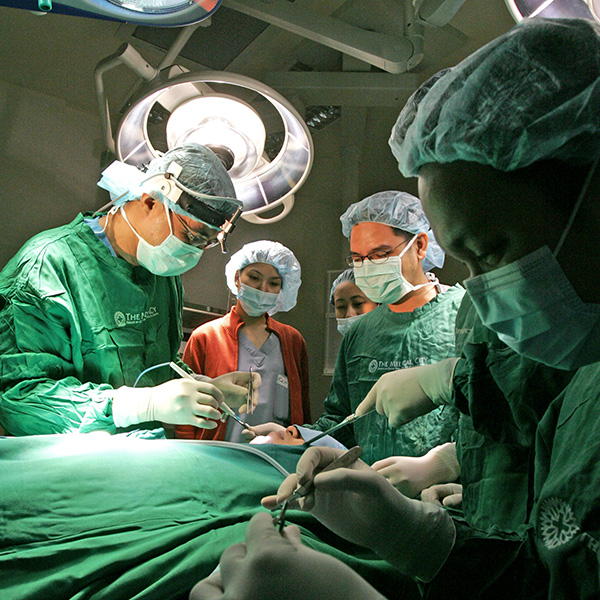Services offered by the unit include Rigid nasal endoscopy, Laryngeal endoscopy, Flexible nasopharyngolaryngoscopy, Biopsies, Ultrasound guided fine needle aspiration biopsy, and Audiometry.
Biopsies can also be divided into nasopharyngeal biopsy, oral cavity biopsy and core needle biopsy. Other service offerings include a nasal and prosthesis laboratory and microvascular reconstruction.
Main services:
(1) Diagnosis: Blood tests for Thyroid hormones, Thyroid ultrasound and fine needle aspiration biopsy;
(2) Treatment: Thyroidectomy, Radioactive Idone Therapy, Thyroid Hormone Replacement Therapy;
(3) For recurrence: Regular follow up, Neck Ultrasound or CT scan, Measurement of thyroid hormone and thyroglobulin.
FAQs
What is Head and Neck Cancer?
Head and neck cancer is a type of cancer that occurs in the head, neck, mouth, throat, or larynx. It can include cancers of the nasal cavity, salivary glands, sinuses, jaw bones, and lips. The most common type of head and neck cancer is squamous cell carcinoma which is responsible for more than 90 percent of all cases. Other types of head and neck cancer include adenocarcinoma, lymphoma, and sarcoma.
What are the Causes of Head and Neck Cancer?
It is not clear what causes head and neck cancers. However, certain risk factors can increase a person's chances of developing the condition. These include smoking or using smokeless tobacco, excessive alcohol consumption, poor oral hygiene, infection with Human Papillomavirus (HPV), exposure to UV radiation from the sun or tanning beds, and occupational exposure to certain chemicals.
What are the Symptoms of Head and Neck Cancer?
Symptoms of head and neck cancer can vary depending on where in the head or neck it occurs. Common signs and symptoms include a lump or sore that does not heal, difficulty swallowing, hoarseness, persistent earache, facial numbness, or weakness caused by nerve damage, chronic sinus infections, and unexplained weight loss. If you or your loved one are experiencing any of these symptoms, it's best to proceed to an experienced cancer clinic.
How is Head and Neck Cancer Diagnosed?
Head and neck cancer is usually diagnosed following a physical examination by a doctor. Imaging tests, such as X-rays or CT scans, can provide further insight into the extent of the cancer. If necessary, biopsies may be taken to examine the tissue for signs of cancer cells.
The Medical City can help you understand and manage your head and neck cancer diagnosis. Our team of experienced specialists is here to provide quality care and support throughout the course of your treatment. We are committed to helping you on your road to recovery.
Who is at Risk of Head and Neck Cancer and Thyroid Cancer in the Philippines?
Anyone can develop head and neck cancer, but certain factors may increase a person's risk. These include age (over 40), smoking, drinking alcohol, and exposure to UV radiation or certain chemicals. People with weakened immune systems are also at higher risk of developing the condition.
Head and neck cancer is a serious condition that can have a significant impact on a person's life. It is important to be aware of the symptoms and risk factors and seek medical attention if any changes are noticed. With early diagnosis and treatment, patients can have higher chances of successful outcomes.
If you have any concerns about your health or you think you may be at risk of head and neck cancer, it is important to speak with your doctor for more information and advice. Your doctor can help you understand the risks, explain available treatments, and provide support throughout the process.
